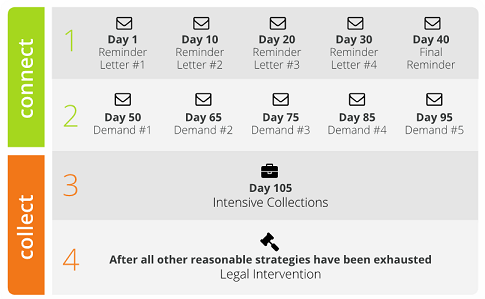
Credit unions nationwide play an essential role in supporting communities, but maintaining healthy cash flow is critical for ongoing operations. Recovering overdue debts, especially from delinquent accounts or unpaid overdraft fees, can be time-consuming and challenging without professional support. That’s where Collect911 steps in.
Step-by-Step Collection Process Roadmap
At Collect911, we follow a clear, structured approach to collections:
- Account Submission: Credit unions submit overdue accounts securely via Collect911’s online portal.
- Initial Checks: We perform USPS address verification, bankruptcy checks, and litigious history analysis to streamline recovery.
- Fixed-Fee Demand Letters: Initial demand letters are sent at a predictable cost.
- Mail Return/No Response: If there is no response, accounts are seamlessly transferred to our Contingency Fee Service.
- Advanced Skip Tracing: Our specialists uncover additional debtor information, enhancing recovery efforts.
- Active Collections: Dedicated debt collectors pursue collections through consistent, professional communication.
- Final Status Update: Accounts either result in successful recovery or conclude as collections exhausted.
Fixed Fee vs. Contingency Fee Service: Customized Solutions
Understanding every credit union has different needs, Collect911 offers flexible collection models:
- Fixed-Fee Service:
- Ideal for recently overdue accounts.
- Provides predictable, upfront costs.
- Ensures quick, efficient action on debts.
- Contingency-Based Service:
- Perfect for older, challenging debts.
- Payment only upon successful recovery.
- Intensive debtor tracing and persistent follow-up.
Security and Compliance Assurance
Protecting member data is paramount. Collect911 maintains strict compliance with:
- Gramm-Leach-Bliley Act (GLBA): Ensures stringent data protection protocols.
- Fair Debt Collection Practices Act (FDCPA): Upholds ethical collection practices, preserving member relationships.
- Cybersecurity Protocols: Robust encryption methods and secure communication channels.
- Regular Audits and Compliance Training: Frequent updates and training sessions ensure adherence to evolving standards.
Advanced Digital Portal Workflow
Collect911’s state-of-the-art client portal makes debt recovery seamless:
- Secure Document Uploads: Credit unions safely submit sensitive documents online.
- Account Tracking: Real-time updates on debtor statuses and collection activities.
- Enhanced Security: Built-in two-factor authentication (2FA) for additional security.
- Transparent Reporting: Clear, accessible online invoicing and reporting.
Nationwide Collection Network
With extensive coverage across the United States, Collect911 ensures:
- Consistent, compliant service nationwide.
- Local expertise to address region-specific challenges.
- Proven, standardized recovery methods for reliable outcomes.
Unmatched Reputation, Proven Results
With a remarkable Google rating of 4.85 stars from over 2,500 reviews, Collect911 stands apart in ethical, professional, and effective debt recovery. Our team’s empathetic yet firm approach prioritizes maintaining strong relationships between credit unions and their members.
Benefits of Partnering with Collect911:
- Comprehensive Coverage: Nationwide debt collection support.
- Customized Solutions: Strategies tailored specifically for credit unions.
- Relationship Management: Prioritizing member satisfaction and goodwill.
- Data Security: Advanced protection for sensitive financial information.
Take the Next Step Towards Efficient Debt Recovery
Enhance your credit union’s financial health and member satisfaction with Collect911’s expert debt recovery services. Experience firsthand why numerous credit unions across the nation rely on Collect911 to simplify debt collection securely, ethically, and effectively.
Ready to streamline your collections process? Contact Collect911 today to get started.


